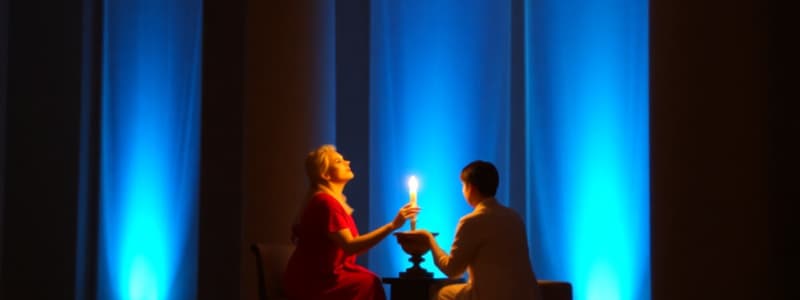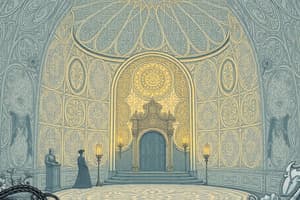Podcast
Questions and Answers
What is the primary requirement for enlightenment to occur within the public sphere?
What is the primary requirement for enlightenment to occur within the public sphere?
- Mandatory education programs focused on critical thinking.
- The granting of freedom to the public. (correct)
- The presence of enlightened leaders to guide the public.
- A complete restructuring of societal norms and values.
The author suggests that many people remain in a state of 'nonage' due to what combination of factors?
The author suggests that many people remain in a state of 'nonage' due to what combination of factors?
- Strict governmental control and suppression of free thought.
- Innate laziness and a preference for physical labor.
- Lack of intelligence and educational opportunities.
- Laziness and cowardice, which encourage dependence on others. (correct)
What does the author imply is the role of 'guardians' in maintaining the nonage of the masses?
What does the author imply is the role of 'guardians' in maintaining the nonage of the masses?
- They offer genuine protection from external threats and internal conflicts.
- They actively cultivate stupidity and fear of independence in those they oversee. (correct)
- They encourage critical thinking and personal growth among the population.
- They provide essential social services that the public cannot provide for themselves.
What is the significance of the phrase "Dare to know! (Sapere aude.)" in the context of the text?
What is the significance of the phrase "Dare to know! (Sapere aude.)" in the context of the text?
Which of the following best describes the author's view on the difficulty of achieving enlightenment?
Which of the following best describes the author's view on the difficulty of achieving enlightenment?
What is the relationship between dogmas/formulas and the state of 'nonage'?
What is the relationship between dogmas/formulas and the state of 'nonage'?
What does the author suggest about the role of personal experience in overcoming 'nonage'?
What does the author suggest about the role of personal experience in overcoming 'nonage'?
In the context of the text, what does the author mean by describing dogmas and formulas as 'mechanical tools'?
In the context of the text, what does the author mean by describing dogmas and formulas as 'mechanical tools'?
What is the primary requirement for achieving enlightenment within a society?
What is the primary requirement for achieving enlightenment within a society?
How does the 'private use of reason' differ from the 'public use of reason'?
How does the 'private use of reason' differ from the 'public use of reason'?
What potential consequence does the text suggest can arise from instilling prejudices within a society?
What potential consequence does the text suggest can arise from instilling prejudices within a society?
The text suggests that revolutions can achieve certain changes, but what is something it argues revolutions cannot achieve?
The text suggests that revolutions can achieve certain changes, but what is something it argues revolutions cannot achieve?
Under what circumstance is it acceptable for a member of the community to argue against or criticize a directive?
Under what circumstance is it acceptable for a member of the community to argue against or criticize a directive?
In the text, what is the author's stance on a church council binding itself and its members to unchangeable doctrines?
In the text, what is the author's stance on a church council binding itself and its members to unchangeable doctrines?
How does the text characterize the role of a pastor in relation to their church's doctrines and their own scholarly pursuits?
How does the text characterize the role of a pastor in relation to their church's doctrines and their own scholarly pursuits?
In order to advance enlightenment, according to the text, which of the following restrictions on freedom is considered the most harmful?
In order to advance enlightenment, according to the text, which of the following restrictions on freedom is considered the most harmful?
How should a scholar approach a situation where their personal beliefs conflict with the doctrines they are required to teach?
How should a scholar approach a situation where their personal beliefs conflict with the doctrines they are required to teach?
The text uses several examples to illustrate its points. Which of these best summarizes the permitted form of critique, using these examples?
The text uses several examples to illustrate its points. Which of these best summarizes the permitted form of critique, using these examples?
What is the most accurate interpretation of the phrase 'Do not argue!' as it is used within the text?
What is the most accurate interpretation of the phrase 'Do not argue!' as it is used within the text?
What is the author implying when discussing how a public, once controlled, may later force its former 'guardians' into submission?
What is the author implying when discussing how a public, once controlled, may later force its former 'guardians' into submission?
What is the critical difference between obedience and arguing, when considering an individual's role in society?
What is the critical difference between obedience and arguing, when considering an individual's role in society?
If a scholar identifies an error in a widely accepted doctrine, what does the text suggest is their responsibility?
If a scholar identifies an error in a widely accepted doctrine, what does the text suggest is their responsibility?
A ruler proclaims, 'Argue as much as you please, but obey!' What is the most accurate interpretation of this statement in the context of the text?
A ruler proclaims, 'Argue as much as you please, but obey!' What is the most accurate interpretation of this statement in the context of the text?
What is the primary criterion for evaluating laws intended for the populace?
What is the primary criterion for evaluating laws intended for the populace?
What action does the text say would be considered a violation of the 'sacred rights of man'?
What action does the text say would be considered a violation of the 'sacred rights of man'?
What should a monarch's primary concern be regarding the religious beliefs of their subjects?
What should a monarch's primary concern be regarding the religious beliefs of their subjects?
What is implied by the statement 'Caesar non est supra grammaticos' in the context of the text?
What is implied by the statement 'Caesar non est supra grammaticos' in the context of the text?
In what way is the current era characterized concerning enlightenment?
In what way is the current era characterized concerning enlightenment?
What behavior should a prince exhibit to be considered enlightened, according to the text?
What behavior should a prince exhibit to be considered enlightened, according to the text?
According to text, why does the author focus on religious matters when discussing enlightenment?
According to text, why does the author focus on religious matters when discussing enlightenment?
What condition is essential for a sovereign to permit public discourse and criticism regarding governance, according to the text?
What condition is essential for a sovereign to permit public discourse and criticism regarding governance, according to the text?
What paradoxical situation does the text present regarding civic and intellectual freedom?
What paradoxical situation does the text present regarding civic and intellectual freedom?
What is the significance of scholars being allowed to act 'regardless of the duties of their office?'
What is the significance of scholars being allowed to act 'regardless of the duties of their office?'
What specific aspect of governance defines a ruler's reputation?
What specific aspect of governance defines a ruler's reputation?
What underlying assumption does the text make about humanity's natural state in the absence of deliberate oppression?
What underlying assumption does the text make about humanity's natural state in the absence of deliberate oppression?
What is the implication of a monarch 'meddling' in religious matters, even with good intentions?
What is the implication of a monarch 'meddling' in religious matters, even with good intentions?
What is the relationship between public order and freedom of thought?
What is the relationship between public order and freedom of thought?
Why is it problematic to establish an unquestionable, perpetual religious constitution?
Why is it problematic to establish an unquestionable, perpetual religious constitution?
Flashcards
Enlightenment
Enlightenment
Emergence from self-imposed immaturity; using one's understanding without needing another's guidance.
Nonage
Nonage
The inability to use one's own understanding without another's guidance.
Sapere aude
Sapere aude
The motto of the Enlightenment, urging individuals to have the courage to use their own understanding.
Laziness and Cowardice
Laziness and Cowardice
Signup and view all the flashcards
Guardians
Guardians
Signup and view all the flashcards
Second Nature Nonage
Second Nature Nonage
Signup and view all the flashcards
Dogmas and Formulas
Dogmas and Formulas
Signup and view all the flashcards
Public Enlightenment
Public Enlightenment
Signup and view all the flashcards
Revenge of Prejudices
Revenge of Prejudices
Signup and view all the flashcards
Limits of Revolution
Limits of Revolution
Signup and view all the flashcards
Freedom for Enlightenment
Freedom for Enlightenment
Signup and view all the flashcards
"Argue, but obey!"
"Argue, but obey!"
Signup and view all the flashcards
Public Use of Reason
Public Use of Reason
Signup and view all the flashcards
Private Use of Reason
Private Use of Reason
Signup and view all the flashcards
Necessity of Obedience
Necessity of Obedience
Signup and view all the flashcards
Officer as Scholar
Officer as Scholar
Signup and view all the flashcards
Citizen as Scholar
Citizen as Scholar
Signup and view all the flashcards
Pastor as Scholar
Pastor as Scholar
Signup and view all the flashcards
Presenting Others Views
Presenting Others Views
Signup and view all the flashcards
Speaking Officially
Speaking Officially
Signup and view all the flashcards
Speaking as a Scholar
Speaking as a Scholar
Signup and view all the flashcards
Limits on Binding Future Thought
Limits on Binding Future Thought
Signup and view all the flashcards
Progress of Enlightenment
Progress of Enlightenment
Signup and view all the flashcards
Unauthorized Decisions
Unauthorized Decisions
Signup and view all the flashcards
Touchstone of Law
Touchstone of Law
Signup and view all the flashcards
Freedom of Criticism
Freedom of Criticism
Signup and view all the flashcards
Perpetual Religious Constitution
Perpetual Religious Constitution
Signup and view all the flashcards
Giving Up Enlightenment
Giving Up Enlightenment
Signup and view all the flashcards
Monarch's True Role
Monarch's True Role
Signup and view all the flashcards
Freedom of Conscience
Freedom of Conscience
Signup and view all the flashcards
Age of Enlightenment
Age of Enlightenment
Signup and view all the flashcards
Enlightened Ruler
Enlightened Ruler
Signup and view all the flashcards
Ruler's Duty
Ruler's Duty
Signup and view all the flashcards
Freedom and Order
Freedom and Order
Signup and view all the flashcards
Civic and Intellectual relation
Civic and Intellectual relation
Signup and view all the flashcards
Commandment
Commandment
Signup and view all the flashcards
Study Notes
- Enlightenment is individuals overcoming their self-imposed inability to use their own understanding without external guidance.
- Nonage arises not from a lack of understanding, but from a lack of courage to think independently.
- "Dare to know!" (Sapere aude) encapsulates the motto of the Enlightenment, urging individuals to have the courage to use their own understanding.
- Laziness and cowardice are primary reasons people remain in a state of nonage, preferring the comfort of being guided by others.
- Guardians perpetuate nonage by infantilizing their "domestic cattle" which discourages independent thought and action.
- Overcoming nonage requires individual effort, which is initially difficult due to lack of practice and ingrained habits.
- Dogmas and formulas, when abused, act as chains that keep individuals in perpetual nonage.
- Public enlightenment is more achievable than individual enlightenment, especially when freedom is granted.
- Independent thinkers are essential to break the yoke of nonage, promoting the value and duty of thinking for oneself.
- Prejudices, when instilled, can backfire on those who impose them, hindering true reform of thought.
- Enlightenment requires the freedom to use one's reason publicly in all matters.
Public vs. Private Use of Reason
- Public use of reason refers to a scholar using their intellect before the reading public.
- Private use of reason is when one employs reason within a specific civic or professional role.
- Restrictions on the private use of reason (within a civic post) may be necessary for societal function but should not impede public discourse.
- An officer must obey orders but, as a scholar, can critique the military service's shortcomings publicly.
- Citizens must pay taxes but, as scholars, can object to the possible injustice of such levies through public discourse.
- Pastors must preach in line with church doctrine but, as scholars, can share their considered thoughts on doctrinal errors publicly.
- A society or church council cannot bind itself to unalterable doctrines, as this obstructs future enlightenment and human progress.
- Each generation has the right to repudiate agreements that prevent progress in insight and enlightenment.
- Laws should be evaluated on whether a people could reasonably impose such a law upon themselves, allowing for temporary orders that permit ongoing criticism and reform proposals.
- Preventing public questioning of established religious constitutions halts human progress and violates the rights of man.
- Rulers should not dictate religious matters but ensure no one is forcibly prevented from pursuing their own salvation.
- Meddling in religious views exposes rulers to criticism.
The Age of Enlightenment
- The current era is an age of enlightenment, marked by progress towards using reason confidently in religious matters, though complete realization is still distant.
- Hindrances to general enlightenment are gradually diminishing.
- A prince embodies enlightenment by granting complete freedom in religious matters and allowing the use of reason in matters of conscience.
- Such a ruler deserves praise for liberating mankind from governmental dependence and allowing individual reasoning.
- Freedom of thought and expression does not necessarily lead to public disorder.
- Rulers have little interest in controlling arts and sciences, but nonage in religion is most harmful and dishonorable.
- An enlightened sovereign permits public discourse on better constitutions and criticism of existing laws.
- A ruler needs a well-disciplined army to guarantee public peace to allow freedom of expression.
- A large degree of civic freedom can paradoxically create barriers to intellectual freedom, while a lesser degree can allow free spirit to expand.
- Nature cultivates the urge for free thought, which then influences public thought and enables freer action, eventually impacting government and dignity of man.
Studying That Suits You
Use AI to generate personalized quizzes and flashcards to suit your learning preferences.




